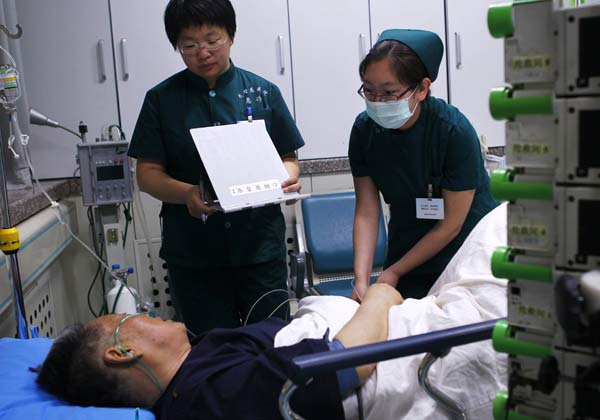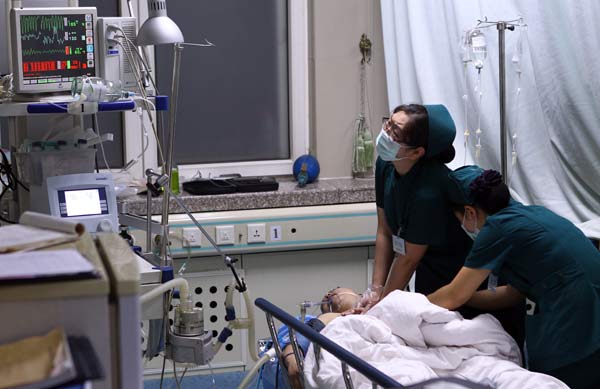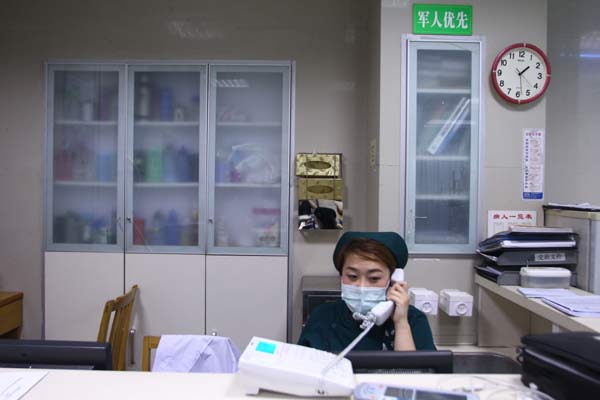Yang Wanli spent a night in ER in a Beijing hospital and witnessed incredible feats of medical skill amid tension, sadness and utter exhaustion.
 |
|
A patient receives treatment at the Armed Police General Hospital in Beijing. Zou Hong / China Daily |
On a Wednesday afternoon, a woman in her late 30s, dressed in a green suit and a pair of old-fashioned flat white shoes, entered the emergency room. The nurses and doctors greeted her with smiles.
"She's on duty tonight, and it's likely to be crazily busy," joked one young nurse.
The woman's name is Ma Lizhi. When not at work, she is at home taking care of the family. But in the Emergency Room Rescue Center at the Armed Police General Hospital in Beijing, she's the boss, leading a team of 10 physicians and 13 nurses, with the power of life and death in her hands.
Every time she starts work, Ma has to be prepared for anything: the acute versus the commonplace, happy endings and tragedies.
As she pointed out, her mind is the only thing that has to be prepared, because after 14 years in the ER, she's seen pretty much everything there is to see.
May 16, 5:00 pm
This is Ma's place of work: Blood, bandages, a cardiac monitor with its constant bleeping, the smell of disinfectant, tears of joy or grief and exhausted nurses and doctors.
The intense atmosphere is similar to that portrayed in TV dramas such as ER or House.
"I love ER. It is very similar to what we do here every day," said Ma. She has only had four hours sleep after 12 hours of continuous work, and had been expecting to go home at midday. However, a drunken patient attacked the doctor who should have been working tonight and, as the chief, Ma took his shift.
The ER is nicknamed the "mad" department. The most seriously injured patients are treated there. The center's 11 beds are always occupied. Last year, an average 260 patients were treated each day, with more than 30 of them being acute cases. At peak times, the number of patients rose to 310.
"It means that each bed needs to serve for three patients every day," Ma said. "It's challenging to treat the most severe cases as quickly as possible. Four hours sleep is normal for us - we've already gained the ability to enjoy power naps." What should have been a brief introduction while she showed me around the unit took two hours as she was constantly called away to treat patients. Six had already been treated since Ma's arrival earlier today.
She said summer is the most "threatening" season for physicians in the ER because people stay out later and drink more. The doctor injured on Saturday was attacked after refusing to supply prescription drugs to a drunken patient without a diagnosis. "It often happens. Our patients are mostly urgent cases and the relatives sometimes shout at or abuse us," said Ma.
Apologizing for keeping her eyes on the patients and the monitors as she spoke, Ma gave instructions to the nurses. A pregnant woman had a high fever and Ma reminded the nurse to give her water regularly and then spoke to the nervous husband, calming him.
Eventually, when all the patients had been treated, Ma sat down and started her dinner, a small bottle of yogurt. But after just one sip, a group of paramedics rushed in with a new patient.
 |
|
Medical staff treat Yang Gang, a 41-year-old heart attack victim, in the emergency room rescue center at the Armed Police General Hospital in Beijing. Mr Yang died later that evening. Zou Hong / China Daily |
May 16, 8:45 pm
Yang Gang, 41, had a myocardial infarction, a severe heart attack, at 5:00 pm, just as Ma was starting her night's work. He was admitted to the hospital three hours after first displaying symptoms and the delay meant he had already lost his "10 golden minutes", the critical period for treatment following a heart attack that provides the best chance for survival. Just a few minutes after entering the ER, Yang was being treated by three of the four nurses in the team who administered drugs and hooked him up to the monitors.
Yang was conscious and Ma kept talking to him, asking how he felt. The excellent teamwork that results from working on thousands of emergencies saw his treatment progress rapidly. After a short while, Yang's condition became stable and he could even speak a little. The medical staff heaved a collective sigh of relief.
However, a few minutes later, Yang had ventricular fibrillation, an abnormal heart rhythm, and sank into a coma. The monitor bleeped urgently as the staff performed a defibrillation procedure to correct the heartbeat three times. Ma and the nurses also administered external cardiac massage.
According to the international handbook of the ER, cardiac massage should be performed 100 times a minute, therefore it's a procedure that requires a lot of manual effort. The air was charged with tension, but after 30 minutes the monitor emitted a regular bleep, indicating that Yang was out of immediate danger
May 16, 9:20 pm
"We pulled him back from the brink! I feel so happy," said Ma. Although it was still hard to tell if the patient's condition would stabilize, allowing surgery the following day, at least he was alive and had a reasonable chance of survival.
Ma sat down and accepted a banana provided by a nurse who urged her to eat something to maintain her strength. "I never thought about becoming a physician, but my mother encouraged me," she explained, "She said the job would benefit the whole family."
It turned out that ER was her destiny, although the heavy workload once prompted her to apply for positions in other departments: "Finally I stayed. I don't know whether it can be taken as a kind of addiction. The feeling of working in the ER is much like choosing a really difficult puzzle. Every time you attempt to solve it, it's incredibly challenging," she said.
In addition to Yang Gang, the ER had also treated dozens of patients in the past few hours, including one with inter-cranial bleeding and another had a severe stomachache. The next time the alarm sounded it was for a man with non-life-threatening fractures sustained in a car accident. Ma threw herself into work once again.
May 16, 10:00 pm
Yang was stable. An hour earlier, the director of the thoracic surgery department had implanted a temporary pacemaker to regulate his heartbeat. Only once his condition improved could the real heart surgery be performed.
Ma spoke to Yang's family, explaining the severity of his condition in simple words to avoid causing unnecessary concern. She gently patted the patient's mother on the shoulder and told her there was still a chance. "You need to be strong for your son. We are trying our best," she promised. The elderly lady just nodded tearfully.
Ma returned to the ER and checked all the patients individually, asking how they felt. Then her family life intruded as she glanced at the clock on the wall. "He's already asleep," she murmured, referring to her 8-year-old son. "I have no time to play with my son and he has become used to spending the evenings with just his father. Sometimes, I feel that he is not that close to me," she said, turning her head to look at the darkness outside the window.
 |
|
Gong Lin on duty at the emergency room in the early hours of May 17. Zou Hong / China Daily |
May 16, 10: 40 pm
Patients came and went. Work in the ER continued relatively peacefully until Yang awoke suddenly. He made some unclear sounds and waved his arms. Ma understood that he might feel uncomfortable with tubes connecting his mouth to the oxygen bottle. She tried to adjust his head position to make him more comfortable but the patient began convulsing and the process of defibrillation started over again.
A long, unbearable wait ensued. In the following 50 minutes, every second seemed as long as an hour. At 11:30 pm, the monitor indicated that the patient's heart had ceased to beat and the machine's display screen showed no sign of cardiac activity.
Exhausted, Ma and the other staff walked out from behind the curtain, their faces white. Ma told Yang's parents that he had not survived. As she spoke, an expression of sadness suffused her features, "Keep the machines on. Give them more time to accept it," she told the nurses.
May 17, 2:30 am
Yang's parents and relatives had said goodbye to him and the bed was empty. "That's the ER. It is like the mystery of life. No one knows who will survive," commented Ma. She still remembers the first patient who died in her care, back in 1998. The man, who had discovered blood in his urine, has been sent to the hospital in the morning, but died in the afternoon before a diagnosis could be made.
May 17, 3:10 am
The flow of patients ceased for a short while and Ma managed to snatch 50 minutes sleep.
May 17, 8:00 am
Four hours after Ma woke from her brief sleep she was still at work. During her 16-hour shift, 312 patients had been admitted, 33 of them in a serious condition. She checked through the medical notes from the night and confirmed drug doses and the condition of the patients with the other staff, then took off her green suit and prepared to leave for home. Suddenly her private life intruded again. "Oh, my God! I missed my son's school day earlier this morning," she said. But by then, it was too late. "His father will have gone with him. I lost a chance to be by his side again," she sighed.
Contact the reporter at yangwanli@chinadaily.com.cn
